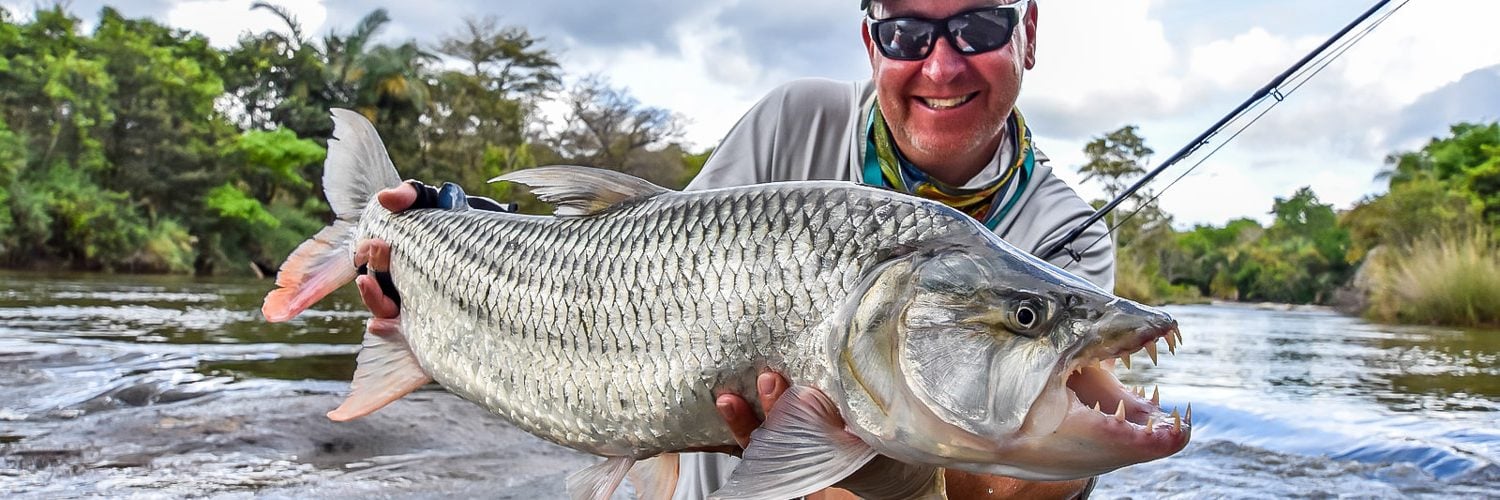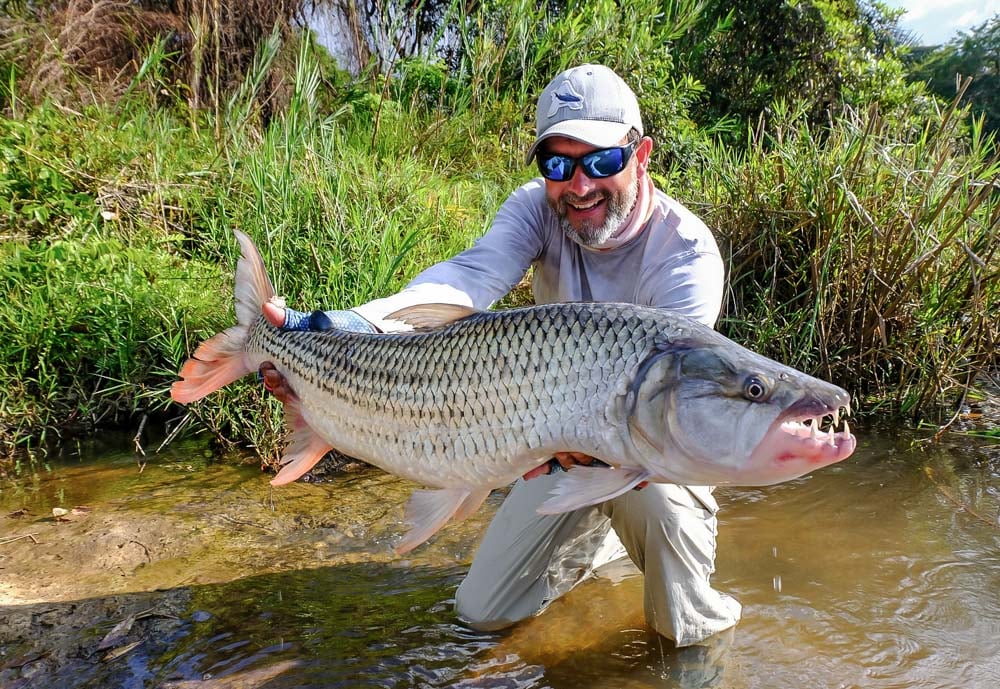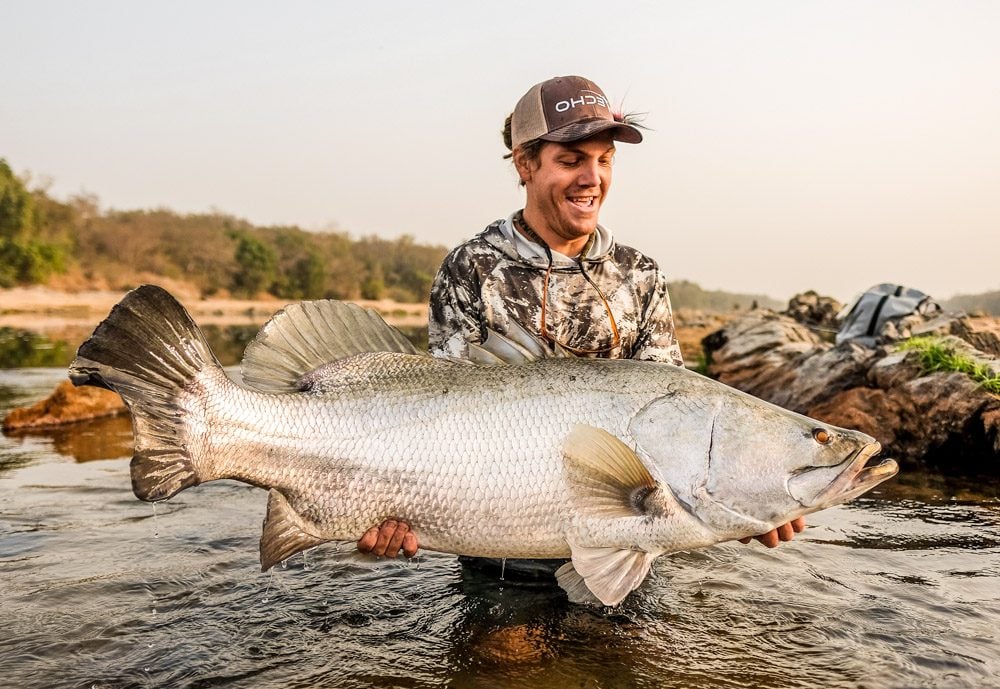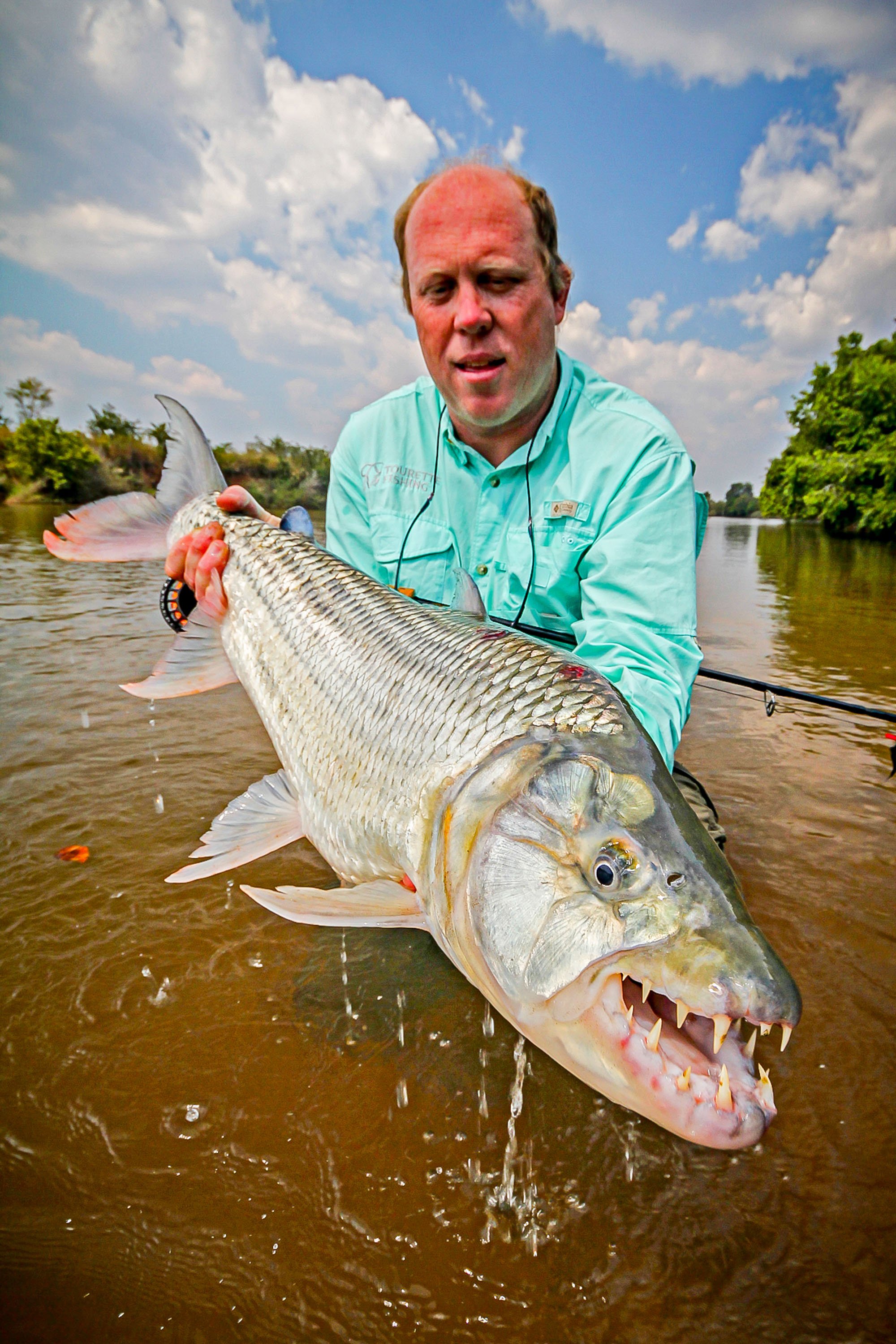

The Tigerfish are highly predatory freshwater fish native to and distributed throughout Africa, inhabiting the lakes, rivers and streams of the Congo River Basin. The fish is often described best by its scientific name, Hydrocynus Vittatus. ‘Hydrocynus’ means ‘Water Dog’ and ‘Vittatus’ means striped, and indeed, the Tigerfish looks like a striped water dog. It’s Africa’s equivalent of the South American Piranha, though it belongs to a completely different zoological family. Like the piranha, individual tigerfish have interlocking, razor-sharp teeth, along with streamlined, muscular bodies, and are incredibly aggressive.
The Tigerfish are fierce hunters; the smaller fish will hunt in large schools, while the larger specimens will hunt alone. They tend to feed on whatever is most available, but their favoured food is other fish, like Gobies, Carp and Clariid Catfish. They were the first freshwater fish recorded and confirmed attacking birds, leaping from the water to catch Barn Swallows in flight. The Goliath Tigerfish is the biggest of the species. Fish to over 100lb have been recorded; however, the more common species average around 8lb, with fish to double figures not uncommon.
Although such ravenous-looking fish might be the stuff of nightmares, they play an essential role in the freshwater ecosystem; they are a source of protein and revenue as tourism for the local people, as thousands of travelling anglers venture to catch these fish every year. They have become one of the bucket list species, especially for the freshwater fly fishing angler.
Below are the top destinations in the world for Tigerfish Fishing.


With our partners, Tourette Fishing, we have put together the best Tigerfish fly fishing to be found on this planet, where fisherman have a real opportunity of landing Tigerfish of over 20lb’s. A destination that provides shots at multiple trophy fish on a daily basis, normally in fresh water this is almost unheard of.


Challenge your fishing ability in the wilds and experience the African bushveld at its best. Gassa Camp in Cameroon isn't about catching fish after fish, but it will present you with the opportunity to cast giant flies in the hope of catching a monster Nile Perch, and there's an excellent chance you'll achieve this and more.


Average Customer Satisfaction Score 90%


Species: Tigerfish
Scientific Name: Hydrocynus Vittatus
Also known as: Tanzanian Tiger, African Tigerfish, Water Dog
The Tigerfish is often described best by its scientific name, Hydrocynus Vittatus. ‘Hydrocynus’ means ‘Water Dog’, and ‘Vittatus’ means striped, which is precisely how it looks. It’s widely considered one of the planet’s most fearsome-looking fish.
It features a muscular, elongated body, which is silvery in colour with slight black stripes or flecks along its flanks. It has a red, forked caudal fin with a black edge. It’s Africa’s equivalent of the South American Piranha, and although it belongs to a completely different zoological family, there are a host of similarities, including its host of interlocking, razor-sharp teeth and incredibly aggressive nature.
They are skilful ambush predators, often hunting in packs, tearing apart any prey unfortunate enough to come within striking range. The African Tigerfish have even been recorded and witnessed attacking and catching birds in flight. They are not renowned for having lots of stamina, but their initial strike is hard, fast and unrivalled.
As the name suggests, the African Tigerfish is found in a vast number of rivers and lakes on the African continent. Countries like Tanzania, Zimbabwe, Mozambique, Angola, and Botswana have good fish populations and some of the most famous rivers include the Zambezi and Congo Rivers, Lake Tanganyika and the Okovango basin.
Our most popular and productive Tigerfish fishing destination, in conjunction with our good friends at African Waters, is based in Southwestern Tanzania on the Mnyera and Ruhudji Rivers, which are widely considered ‘THE‘ best locations for specimen fish in the 10lb to 25lb range.
On both waterways, the aquatic ecosystem is incredibly rich and packed full of baitfish, predominantly red-finned barbs, one of the Tigerfish’s favourite meals. Combine this with the fact that the fishery has been well managed and monitored and the result is an unrivalled population of specimen Tigerfish.
The best Tigerfish fishing on the planet:
Trophy Tigerfish Safari Tanzania
Fact: In the past fifty years, no fly fisherman had caught a 20lb fish targeting Tigers on the fly. However, this record was broken in 2008 when eight fish weighing over 20lb were caught in just as many days on a particular section of the Mnyera River. With an increasing number of stories like this, many serious anglers have acknowledged the discovery of the Mnyera and Ruhudji river systems in 2008 as one of the biggest things to happen in African sportfishing in the past 20 years.
Tigerfish can be caught on fly, lures, and bait, but however you fish for them, your tackle needs to be up to the job. Stiff rods, wire traces and strong hooks are a must.
Fly Fishing For Tigerfish
We recommend taking two 9-weight or 10-weight rods with a smooth dragged reel capable of holding 350 metres of 30lb backing. Flies of all shapes and sizes work, but they must have one thing in common: super-strong hooks. The Tigerfish are immensely strong and have powerful jaws and super sharp teeth. Couple this with their incredible fighting power and the fact you often have to stop them from running into the structure; you want to avoid messing around with delicate hook patterns.
Lure Fishing For Tigerfish
We recommend using a 7ft or 8ft rod, with a fairly stiff action to help set the hooks in their hard bony mouths, matched with a good quality spinning reel, with a smooth drag loaded with 20-30lb mono or 30-40lb braid is suffice. A whole host of hard lures, spoons and spinners will catch the majority of fish.
The IGFA record for the African Tigerfish is 35lb 7oz landed from Kariba in Zimbabwe in 2001. However, fish of this size are incredibly rare; on average, anglers will encounter fish between 5lb and 10lb. A double-figure Tigerfish is a good fish, while anything over 20lb is classed as a proper specimen.
Note: There are a few variations of Tigerfish, and the most famous, aside from the African species written about above, is the Goliath Tigerfish. These were made famous by Jeremy Wade and his ‘River Monsters’ TV series, where he landed a giant measuring 5ft in length from the River Congo. These fish are incredibly scary; on average, their teeth will grow to over 2.5cm long, and they’ve been recorded to over 150lb.
A number of incidents have been reported in the Congo of this fish attacking humans. This reputation, combined with its strength, has earned it an almost mythical status among anglers.











